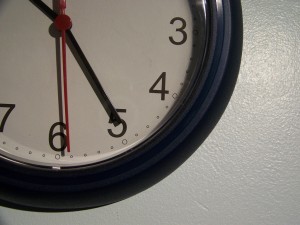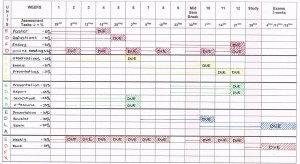As our children mature, society expects them to be able to manage their daily activities, deadlines, schedule appointments, and prioritise some activities over others.
 Children with ADHD, and many other children, find this particularly challenging but you can help by:
Children with ADHD, and many other children, find this particularly challenging but you can help by:
- Identifying what tasks need to be completed and when they need to be completed. Encourage your child to write them down. Referring to planners, and calendars can be useful.
- Encouraging your child to break down assignments into parts, e.g. research, introduction, body, conclusion and estimate how long each part may take to complete.
- Using a calendar or timeline, invite your child to work backwards from the due date of the assignment to plan their use of time based on their estimates. For example, an assignment is due on the 20th so your child may estimate they need one day to do a final edit (19th), one day to write the conclusion (18th), two days to write the body (16th and 17th), one day to write the introduction (15th), and three days to do the research (12th, 13th, 14th). Based on this your child would need to start the assignment on the 12th. Your child may need to start earlier though due to other commitments so assist them in taking these into account.

- Assisting your child to write to-do lists with the most pressing tasks at the top. Your child can cross off tasks as they are completed.
- Helping your child reduce delaying tactics such as having to find their pencil, or needing a drink by assisting them with being organised – something children with ADHD can also find challenging.
- Using timers (visual and auditory) to help your child stay on task during brief time periods, e.g. homework for ten minutes then a break.
- Making a game out of predicting how long activities will take. Then time your child actually doing the activity and check how accurate your child’s estimates are. Children with ADHD have difficulty estimating the passing of time but practising in a fun way can motivate them to persist with this skill.
Being able to understand and use time and sequence terms, relate them to clocks and calendars, and prioritise tasks will enable all kids and especially kids with ADHD to follow instructions and routines more easily, help them to understand how organising time helps, and ultimately promote their ability to start organising their own time using the tools you’ve given them.
And just for the record- getting a child with ADHD to learn to organise themselves, and build their own routine is one of the greatest achievements of our age, and deserves medals and trumpets, for parents and kids!
Read more: ADHD kids and routines
Sources
Dawson, P. and Guare R. (2009). Smart but Scattered The Guildford Press: New York.
Goldberg, D. & Rief, S. Helping ADHD Children Master Timehttp://www.additudemag.com/adhd/article/5992.html. Retrieved 15/9/15.
Miller, S.A., Booth Church E., & Poole, C. Ages & Stages: How Children Develop a Sense of Time http://www.scholastic.com/teachers/article/ages-stages-how-children-develop-sense-time. Retrieved 15/9/15.
*Time Management for ADHD Kids http://adhdkids.org.uk/time-management-adhd-kids/ Retrieved 15/9/15.
